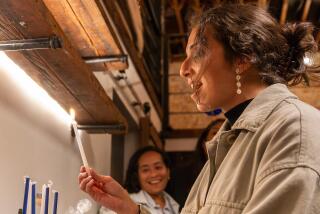Once-Thriving Community Dwindles : Days Are Numbered for Jews of Cochin in India
- Share via
COCHIN, India — The maharajah granted Jewish settlers the right to stay here unmolested “so long as the world and the moon exist.”
That was in the year AD 379, and the maharajah, Sri Prakaran Iravi Vanmar, also allotted the Jews a rug, a parasol, a drum, a trumpet and the right to collect tolls on carts and boats.
All this is recorded on copper plates given to Joseph Rabban, who at the time was the leader of the Jewish community. The plates survive and are displayed in the synagogue here, which was built in 1568.
No Persecution
Except for occasional attacks from outsiders--Moors and Portuguese colonists--the maharajah’s pledge has been kept. There is no record of any persecution by the local people against the Jews of Cochin, the old princely state that is now part of the state of Kerala.
“This is the only country in the world where the Jews have never been persecuted by their own nationals,” said Jackie Cohen, 64, whose ancestors migrated to Cochin 300 years ago from Iraq. Cohen is the shamas, the synagogue’s caretaker.
Yet after nearly two millenniums--the first Jews fleeing Roman persecution in Palestine arrived here late in the 1st Century--the world and the moon of the so-called white Jews of Cochin will soon cease to exist. There are only 31 of them left in the ghetto at the tip of the Cochin Peninsula.
150 Left Now
No more than 150 Jews, including the so-called black Jews converted from Hinduism, remain in all the state of Kerala, compared to more than 5,000 before the creation of Israel in 1947.
“This town and the people around here used to be known as a second Jerusalem,” Cohen said somewhat mournfully as he guided a group of Hindu tourists through the synagogue. “Once there were eight synagogues in Kerala. This is the only one left.”
One of the tourists, bewildered by the lack of idols in the synagogue, interrupted Cohen to ask if he could see the Jewish God.
“I try to tell them about God in the abstract,” Cohen said in an aside to a reporter, “but they have a hard time understanding.”
Living History
Cohen and the other Jews here have become living history, objects of curiosity to the Hindus and Muslims and the occasional tourist from abroad.
Across the street from the synagogue is the Athena arts shop, where a Christian named Anthony George sells Hindu and Christian trinkets. George’s shop is crammed with wooden statues of Jesus Christ, metal sculptures of Ganesha, the Hindu elephant god, and other religious objects. The shop is part of what used to be a Jewish residence, then a hotel for Brahmins, the Hindu high caste. George leases space from the people who use the rest of the place for a ginger warehouse.
“When we started this business,” George said, “the people here were not so happy about it. They didn’t like all these idols just in front of the synagogue. Now there are only old people left.”
Economic Exodus
Most of the Jewish people migrated westward long ago, primarily to Israel. Unlike many Israelis, who left wherever they were to get away from persecution, the Jews of Kerala left for economic reasons. There is more opportunity in Israel than in impoverished India, where per capita income is less than $300 a year. All but a few of those who remain are, like Cohen, in their 60s and 70s.
One of them, E. S. Koder, 76, said: “We are rapidly dwindling down. No one new will come here now.”
Koder, dressed in a sleeveless undershirt and pajama bottoms, stood barefoot in the street in front of his family home. He paused to shoo away the local beggar, addressing him in Malayalam, the language of Kerala.
“We speak Malayalam in our home,” he said.
A panel next to the front door bears the words, in Hebrew, “House of Hope.” A star of David is worked into the iron grill.
Son in Israel
Koder, whose family made its money importing liquor, retired years ago. He amuses himself now by raising monkeys, which he keeps in cages on the front porch. He has a son in Israel, but he says he has no plans to join him there.
“We are a well-known family here,” he said. “If I go to Israel, no one will know me.”
When Cohen and Koder and the rest of their generation are gone, the once-prosperous Jewish community of Cochin, one of the oldest uninterrupted Jewish communities in the world, will have gone with them.
“Once we leave this place,” Cohen said, “we are gone forever.”
Los Angeles Times
More to Read
Sign up for Essential California
The most important California stories and recommendations in your inbox every morning.
You may occasionally receive promotional content from the Los Angeles Times.













